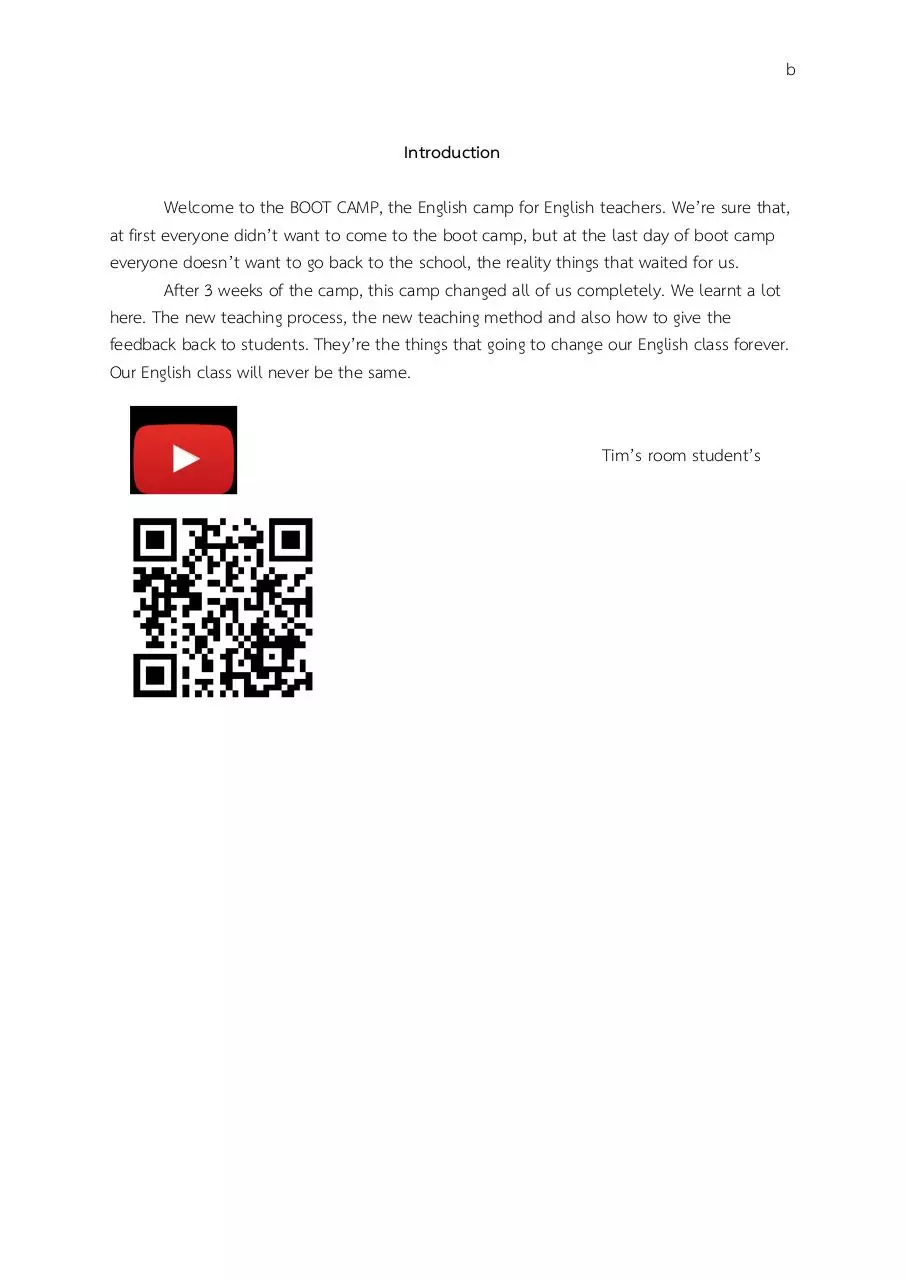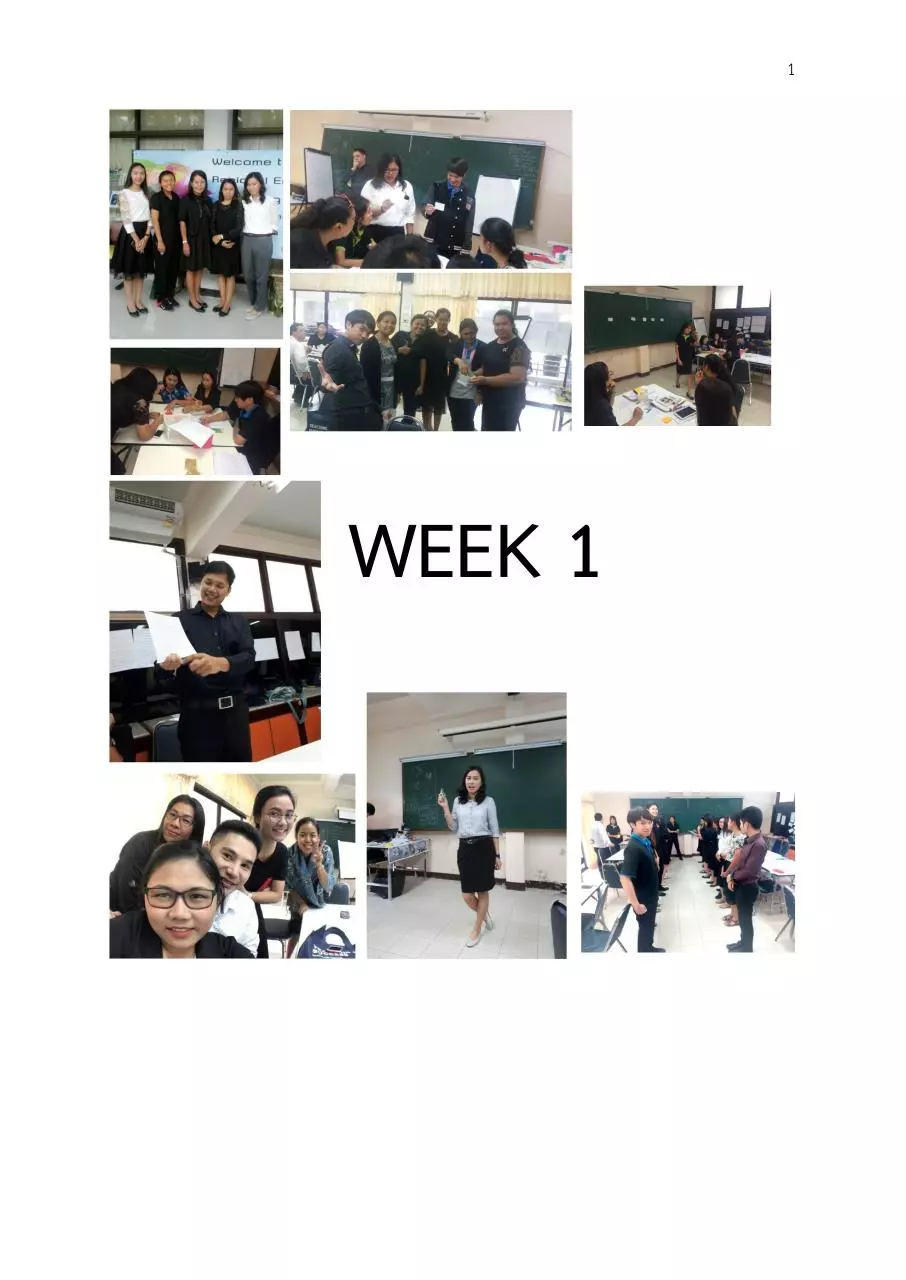00 Tim's Room Yearbook (PDF)
File information
Author: Windows User
This PDF 1.4 document has been generated by Microsoft® Word 2013, and has been sent on pdf-archive.com on 15/08/2017 at 16:45, from IP address 49.49.x.x.
The current document download page has been viewed 902 times.
File size: 14.31 MB (114 pages).
Privacy: public file





File preview
a
b
Introduction
Welcome to the BOOT CAMP, the English camp for English teachers. We’re sure that,
at first everyone didn’t want to come to the boot camp, but at the last day of boot camp
everyone doesn’t want to go back to the school, the reality things that waited for us.
After 3 weeks of the camp, this camp changed all of us completely. We learnt a lot
here. The new teaching process, the new teaching method and also how to give the
feedback back to students. They’re the things that going to change our English class forever.
Our English class will never be the same.
Tim’s room student’s
c
Table of contents
Week 1………………………………………………………………………………………………………………………............1
Getting to know + introducing………………………………………………………………………………..2
Vocab Teaching within' receptive skills…………………………………………………………………8
Week 2………………………………………………………………………………………………………………………............25
Teaching Grammar……………………………………………………………………………………….............26
Activity for Grammar …………………………………………………………………….…………….............27
Motivating Activity …………………………………………………………………….…………………...........29
Giving Feedback …………………………………………………………………….…………….………...........32
Week 3…………………………………………….…………..…………………………………………………..……….............35
Teaching Listening ………………………..………………………………………………….….………...........36
Teaching Speaking ………………………..………………………………………………….….….……...........37
Teaching Reading ………………………..………………………………………….…..….….….……...........42
Teaching Writing ………………………..……………………………………………………...…..……...........43
Integrating Skills ………………………..………………………………………….…………...…...……...........44
Activity Bank………………………..………………………………………………………..…...…………...........46
Appendix………..………………………………………………………………………….……………..…...…………...........60
Mind Mapping…………………………………………………...…………….……………..…...…………...........61
Lesson Plans ………………………………………………………………….……………..…...…………...........64
Class Members…………………………………….……………..…...……………………………..……...........104
1
WEEK 1
2
Getting to know
Meaning : Even simple social tasks like inviting a person out to a restaurant can
cause embarrassment and stress. This lesson includes discussions of why such
situations are difficult, as well as plenty of practice.
Aims:
To discuss techniques and potential problems connected with moving from
superficial relationships towards friendship and partnership.
To introduce a range of functions and exponents for inviting, insisting,
accepting, refusing, etc.
To practice the language and skills in a series of controlled and freer roleplays.
1. Classroom English
Pelmanism
Pictures and Vocabulary Words
If you are teaching a set of simple vocabulary to your students, try
making a copy of the page from a picture dictionary to make a set of
memory cards.Have students cut out the pictures and paste them on blank
index cards. Have them write the corresponding vocabulary words on a second
set of cards. Shuffle, and your students are ready to play and review the words
they are learning.
Words and Definitions
If your students are beyond the picture dictionary stage, you can have
them match vocabulary words and their definitions in a game of memory. In
this case, have students write out the definitions of several words on blank index
cards and the words on other cards before playing.
3
Words and Synonyms
I love to teach groups of vocabulary words, and you can practice
them in a game of memory. Have students write individual words on cards and
their synonyms on other cards. You can have students write only two synonyms
to match, or you can have them write out any even number and allow matches
with any of the words.
Words and Antonyms
Like matching synonyms, you can do the same with antonyms. Have
students write their target vocabulary on cards and opposites of those words on
other cards. You should have one to one matches for words and their antonyms if
you play this version.
Fill in the Blank with a Correct Verb Tense
If you are reviewing verb tenses, use memory to make fill in the blank
exercises more fun. Have students write a sentence (with time indicators) on one
card and the correct verb to complete it on another. Shuffle, lay out the cards,
and then play to see who can make the most matches.
Quantifiers and Noncount Nouns
Noncount nouns can be tricky, especially when you have to remember
the right quantifiers to go with each. Have students match noncount nouns and
their quantifiers in a game of memory to solidify which pairs go together.
4
Prepositions of Time and Time Phrases
In 2015, on Wednesday, at 2 o’clock….prepositions of time can be
confusing.You can have your students make several matches between
prepositions of time and specific points on the calendar or clock and match them
in this game.
Prepositions of Location
If you want to practice prepositions of location with your students, you
can still play memory. Print out some diagrams that show the physical
relationship between two objects and stick them to some index cards, and them
write their corresponding prepositional phrases on a second set of cards.
Fill in the Blank with the Correct Article
Are your students studying the differences between articles in
English? Use memory to play a fill in the blank style matching game with sentences
and articles such as a, an, the, these, those, this, and that.
Match Words with their Contractions
How well do your students know their contractions and their
sources?Check by having them match the two in this simple version of memory.
Simply write the source words on one card and the corresponding contraction on
the other. If you really want to challenge your students, include the cards their,
there, and its that will have no matches.
5
Abbreviations and their Words
In a similar vein to contractions, have students match abbreviations to
common words in English. You might include abbreviations for days of the week,
months of the year, or geographical locations.
Irregular Past Tense Verbs
Matching irregular verbs to their past tense forms is a simple and fun
version of memory. The prep is also very easy since each card only needs one
word written on it, and your students probably have a list of irregular verbs
somewhere in their grammar text book.
Phrasal Verbs Breakdown
Do your students get down, boogie down, lay down or all of the
above? You can use memory to practice phrasal verbs when your students match
the two words in the verb to each other in a simple game of memory.
Match Minimal Pairs
If you are working on pronunciation with your students, have them
match minimal pairs (words that vary in only one sound such as bat and
cat). Your students will have to look beyond the spelling of the words on the card
and remember how each is pronounced to find the correct matches in this version
of the game.
Match Same Vowel Sounds
Another way to use memory in testing pronunciation is to have students
match words which have the same vowel sound. Again, students will have to
look beyond the spelling of English words to get their matches correct.
6
Match Questions and Answers
Matching questions and answers can be used for all types of language
instruction. You can use them to review question and statement formation. You
can use them to test the meaning of who, what, where, when, why, and how. You
can even use them to test reading comprehension.
The Phonetic Alphabet
If you have taught your students the phonetic alphabet to help their
pronunciation and listening comprehension, you can review that in a game of
memory, too. Write out some words out with traditional English spelling as well
as phonetic transcription. Have students match the two to each other.
Vocabulary box
A small box, such as a shoe box, is a very useful tool in the classroom - it can
become a vocabulary box. You also need some small blank cards or pieces of
paper
At the end of each vocabulary lesson - for example 'Houses and Homes' - either
you or the students should write words from the lesson on different cards. So,
you may end up with ten words on ten cards (bedroom, kitchen, roof, window,
etc) and these cards are then placed in the vocabulary box. If you have time, and
with stronger classes, you, or the students, may write a definition of the word on
the reverse of each card.
This vocabulary box can then be used at any time to review the vocabulary
studied over the weeks.
You could simply pick words from the box at random, give the definition and ask
for the word. This can be done as a simple team game.
Or you may try something more active. For example, when you've had this
vocabulary box for a month or two and there are quite a lot of cards in there, you
might say to the students 'OK, I want all these cards divided into nouns, adjectives
and verbs… Go! You have three minutes.' Or, you might say 'OK, I want all these
Download 00 Tim's Room Yearbook
00 Tim's Room Yearbook.pdf (PDF, 14.31 MB)
Download PDF
Share this file on social networks
Link to this page
Permanent link
Use the permanent link to the download page to share your document on Facebook, Twitter, LinkedIn, or directly with a contact by e-Mail, Messenger, Whatsapp, Line..
Short link
Use the short link to share your document on Twitter or by text message (SMS)
HTML Code
Copy the following HTML code to share your document on a Website or Blog
QR Code to this page

This file has been shared publicly by a user of PDF Archive.
Document ID: 0000646859.